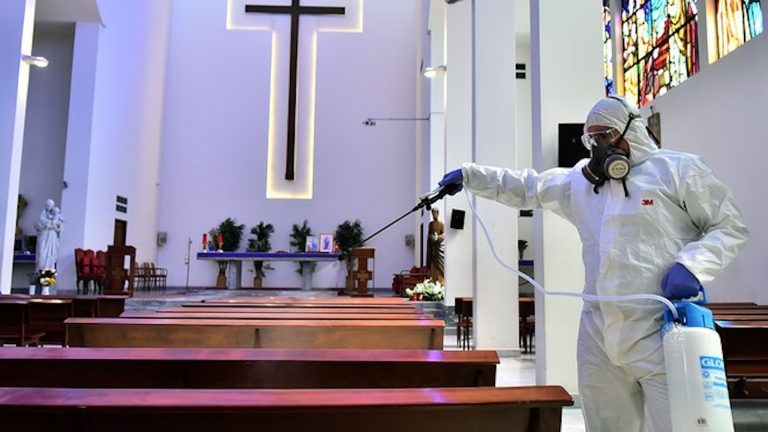American workers and small businesses have been devastatingly impacted by the economic shutdown in response to COVID-19. Many people are crushed. Now Congress has deemed this government inflicted devastation in need of the Cares Act, a $2 trillion dollar stimulus package, and this week Americans will begin checking their bank accounts for the arrival of their checks.
There are other casualties to the coronavirus shutdown, and although maybe not as obvious, just as serious. Churches and religious leaders, who rely heavily on the passing of the offertory plate are struggling. As part of the Cares Act, religious groups will be able to see their losses offset by the federal government. However, these religious groups should prudently reject any economic relief of this kind.
Followers of Judeo-Christian religions in the West have been learning the hard way that acceptance of government funding may require adherence to laws that contradict their teachings. There is nothing immoral about accepting government funding; the danger lies in the strings attached. Religious leaders and the faithful alike need to ask themselves if accepting such money will slowly affect their church’s ability and zeal to remain free.
He who drinks the king’s wine, sings the king’s song.
Just this past Easter weekend we saw the Kentucky governor stretch his reach into church parking lots. License plate numbers were collected by state police, and any worshipers who chose to attend a service against the mandatory shelter-in-place order were threatened with a 14-day quarantine. This type of tyranny would become even more prevalent, if governors hold the churches’ purse strings.
It is a slippery, slippery slope. Continually compromising religious teachings for government funding can erode churches into little more than another government bureaucracy. If there is any doubt of this, Americans can look to Germany as a warning. For years, German churches have relied on a tax to fill their coffers, so that now their church leaders are fearful to speak out on matters of morality or religious truth due to the political repercussions.
At this issue’s roots is the fact that incentives matter. Churches accustomed to government funding will find it difficult to resist additional money even at the expense of softening their teachings. German churches may enjoy full coffers, but like Christian churches across the globe, they are struggling with empty pews. Is there a possible link between failure to teach truth and growing religious apathy?
Examining this thought more closely, we see that millennials represent the largest segment of “nones” (persons with no religious affiliation in the United States). Those remaining attached to a church have shifted towards Anglican, Roman Catholic, and Orthodox traditions. These churches have remained steadfast in adhering to their core beliefs.
Paging through the stories of our global history, we often see the church standing as our last line of defense for liberty against the suffocation of despotic regimes. The faceoff between a sickly Polish priest, Father Jerzy Popieluszko, and the Soviet Union in the 1980s, for example. The story in its entirety needs more space than I have here, but Father Jerzy lived and breathed unfettered courage in speaking truth to power, and ultimately gave his life for his principles. He was the spark that brazened the Polish lust for freedom and began the toppling of the iron curtain.
At minimum, government money will tempt religious leaders and churches to compromise their vocation in proclaiming moral truth. And this softening seems to strongly correlate to the exodus of people from organized religion. Churches should prudently reject any aid from the state. Refusing government money does not guarantee religious liberty will be protected but allows breathable gap. And it just takes a little crack to let the light in. Maintaining separation of church and state helps protect the independence of church and religion. And this independence is key to the church remaining a protector of liberty for all people and not just another government bureaucracy.














There should be no strings attached concerning churches. A government or governing authority cannot make laws or regulations concerning churches or religion.
1st Amendment
Congress shall make no law respecting an establishment of religion, or prohibiting the free exercise thereof; or abridging the freedom of speech, or of the press; or the right of the people peaceably to assemble, and to petition the Government for a redress of grievances.
1st Amendment Explanation
The first amendment states that Congress may not do anything that regulates or establishes any religion, nor can it do anything to stop people from observing their religion. This amendment guarantees freedom of religion in the United States. The government may not limit freedom of speech; meaning people may say almost anything. The limit being the famous opinion of Supreme Court Justice Oliver Wendell Holmes, when he gave the example that no one could falsely cry “fire” in a crowded movie theater. Thus you may not say anything that is untrue or brings immediate danger to people or both.
The Constitution gives almost absolute freedom of the press as long as it is not known to be untruthful. When the government tried to stop the New York Times from publishing the Pentagon Papers, the Supreme Court refused their request. The Constitution gives the people the right to protest, which is the right to peaceably assemble. Finally, this amendment protects the work of some of the most criticized groups in Washington: the lobbyists. The amendment specifically states that no laws may be made to stop people from petitioning the government and that has been interpreted to include paid lobbyists.
When Socisl Security was implemented in the 1930s the church should have been the biggest opponent. Rather than do as they should by saying, “That’s our job,” the church breathed a sigh of relief because they didn’t have ti worry about old people anymore. Same thing happened in the 1960s with Medicare. Most hospitals were owned by the churches and much to their shame they began taking reimbursement from the government for services they used to render charitably. Bush 43 proposed government money for faith-based organizations and they happily took it. The churches’ modern irrelevance began a long time ago.